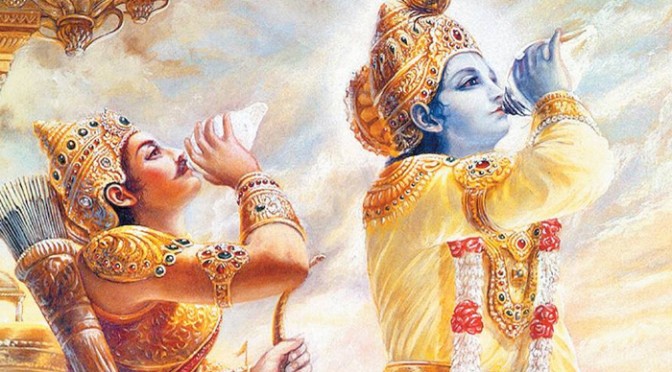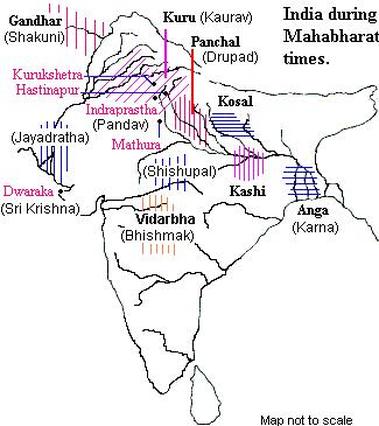Gita Jayanti
Gita Jayanti ( Geeta Jayanti ) is the birthday or anniversary of Srimadh Bhagavad
Gita. Containing the most auspicious of all knowledge or if you like the mother of all
the world's spiritual knowledge. Sri Gita has 18 chapters and 700 shlokas or verses.
The immortal knowledge is based on a dialogue some 6000 years ago between Sri
Krishna and his most ardent disciple, Arjuna on this day, which came to be known
as Sri Gita Jayanti. It was also narrated at the same time to King Dhritarashtra (who
was blind) by Sanjay - who was given divine eyesight to watch the battle
of Mahabharata from a very far distance away.
The day falls on Ekadashi, Sri Krishna's favorite day of the month for vrats (fasting)
and archana (worshipping). It is on the 11th day of shukla paksh (bright side) of the
month of Margsish.
On this day devotees could recite the whole of Gita or failing that at least one
chapter or even one shlok. Others also perform havan and make offerings of ahuti
with each shloka.
Mahatma Gandhi
Sri Krishna's message to Arjuna so many years ago still holds true to all of us today.
Arjun's difficulties and dilemma in those days during the battle
in Kuruchetra (today's Hariyana in India), is very much comparable to our daily
battles.
In our modern day Mahatma Gandhi once said: "When disappointment stares me in
the face and all alone I see not one ray of light, I go back to the Bhagavad Gita...I
immediately begin to smile in the midst of overwhelming tragedies and my life has
been full of external tragedies. If they have left no visible, no indelible scar on me, I
owe it all to the teachings of Srimadh Bhagavad Gita."
And who in our day and age would have faced more struggles in life than Mahatma
Gandhi. He found solutions to his daily problems in Srimadh Bhagavad Gita.
Ved Vyas-ji, the author of so many Granths(scriptures) says that while bathing in
Ganga River and drinking the jal helps us cleanse us of our worldly sins, "The one
who lives according to the Gita can liberate others."
Mahabharat
Sri Gita Jayanti was born in the backdrop of the Great War of Mahabharat. Arjun was
ready to fight in a war though he had in inner thoughts that the battle could be
avoided. The war was between the five Pandavas brothers - who were
promoting Dharma or truth. In their opposition were the Kauravas - who though
were distantly related to the Pandavas - were living on Adharmic or non-religious
means.
Sri Krishna-ji first took to reason with the Kauravas in a move to avert the impending
war but they refused to budge. The dispute primarily based on land issues would
have been easily settled had the Kauravas agreed to Sri Krishna's offer to take the
whole of the disputed land and spare one house for the Pandavas to reside in.
When Sri Krishna's offer was refused by the Kauravas, he suggested to Arjun and
the Pandavas that war was the only option.
Thus the imminent war was dawning upon Arjun in Kuruchetra. But Arjun had
doubts - why should so many innocent lives be taken when consultation can avoid
the deadly war? Arjun's arguments formed what became the Chapter One of
Srimadh Bhagavad Gita.
From the second chapter onwards, Sri Krishna began his lecture - but only after
Arjun surrendered on the lotus feet of Sri Krishna - one of most revered avatars of
the supreme God, Sri Vishnu.
That is when Sri Krishna stepped in and advised Arjun of their daily living, karma
(action), dharma (truth or religion), bhakti (devotion ). He explains that the most
important task for any human is finding ways to connect with God and we all can do
that by:
- Bhakti (devotion) and Satwick life style as espoused by Sri Krishna in the Gita
- Satwick Gyaan (wisdom)
- Shudh Karma (through good deed/action)
of interest where the Great Epic of Mahabharat unfolded.
Arjun
He was famous and an extremely powerful warrior with high credentials. Fighting
against the Kauravas, he was unable to rationalise between what is Dharma (truth)
and what is not [Adharma]. He was in doubt and confusion.
Arjun was helpless. He faced real challenges in life and so he turned to God for
answers. It teaches us this important lesson, that when in doubt look towards God
for answers.
Arjun was transformed by the Gita knowledge. He became better informed about
life and good karma. He developed a better mental attitude and his outlook
towards life changed forever. As Sri Ved Vyas-ji once put it, Arjuna was awakened
or enlightened.
Sri Krishna thought that Arjun was the best disciple to receive the divine knowledge
- which became the holy Bhagavad Gita.
Sri Krishna did not change the situation - i.e. he did not change the battlefield but
influenced Arjun into righteousness - differentiating between Dharma and Adharma.
To encourage Arjun in the battle, Sri Krishna became his chariot driver and stayed in
the whole Mahabharat without a weapon. He was the only person in the war without
a weapon.
Non-Hindus
While espousing that spirituality should be a daily habit and not a part-time aspect
of our life, Sri Krishna says that good karma can be performed by everyone. Even a
non-Hindu can understand and follow the preaching of Bhagavad Gita - it shows us
how to conquer evil aspects of our life and instill the good among ourselves.
The wisdom derived from the teachings of Gita are broad and universal. It is not
associated with a group of Hindus or otherwise. Nowhere in the Bhagavad Gita,
does he say that the holy scripture is for Hindus only. The knowledge is available to
all and can be adopted by everyone -regardless of ethnic group, sect, creed, age or
country of origin. Everyone can find meaning in their life though Gita's teachings. It
is a means of finding perfection in life.
It is said that Gita's teachings strengthen us when we're weak and inspire us when
we're depressed.
Sri Krishna's assurance to us all:
"I become the saviour from this mortal world for those whose minds are set on Me".
Mahatma Gandhi perhaps sums up best about the holy Gita, "The Gita has been my
mother. I lost my mother when I was young, but I never felt the absence of a
mother, because I had the Gita with me."
Panditji's recommendations for Gita Jayanti:
1) Observe Ekadashi fast on the day
2) Offer yellow flowers, bananas and sweet Prasad made out of wheat and ghee
3) Offer tulsi leaves
4) Recite Bhagavad Gita (whole 18 chapters if possible, if not at one chapter, if unable then at least one shlok.
5) Perform aarti and Shanti Mantras
We invite readers to send their comments and enquiries to [email protected]
He was famous and an extremely powerful warrior with high credentials. Fighting
against the Kauravas, he was unable to rationalise between what is Dharma (truth)
and what is not [Adharma]. He was in doubt and confusion.
Arjun was helpless. He faced real challenges in life and so he turned to God for
answers. It teaches us this important lesson, that when in doubt look towards God
for answers.
Arjun was transformed by the Gita knowledge. He became better informed about
life and good karma. He developed a better mental attitude and his outlook
towards life changed forever. As Sri Ved Vyas-ji once put it, Arjuna was awakened
or enlightened.
Sri Krishna thought that Arjun was the best disciple to receive the divine knowledge
- which became the holy Bhagavad Gita.
Sri Krishna did not change the situation - i.e. he did not change the battlefield but
influenced Arjun into righteousness - differentiating between Dharma and Adharma.
To encourage Arjun in the battle, Sri Krishna became his chariot driver and stayed in
the whole Mahabharat without a weapon. He was the only person in the war without
a weapon.
Non-Hindus
While espousing that spirituality should be a daily habit and not a part-time aspect
of our life, Sri Krishna says that good karma can be performed by everyone. Even a
non-Hindu can understand and follow the preaching of Bhagavad Gita - it shows us
how to conquer evil aspects of our life and instill the good among ourselves.
The wisdom derived from the teachings of Gita are broad and universal. It is not
associated with a group of Hindus or otherwise. Nowhere in the Bhagavad Gita,
does he say that the holy scripture is for Hindus only. The knowledge is available to
all and can be adopted by everyone -regardless of ethnic group, sect, creed, age or
country of origin. Everyone can find meaning in their life though Gita's teachings. It
is a means of finding perfection in life.
It is said that Gita's teachings strengthen us when we're weak and inspire us when
we're depressed.
Sri Krishna's assurance to us all:
"I become the saviour from this mortal world for those whose minds are set on Me".
Mahatma Gandhi perhaps sums up best about the holy Gita, "The Gita has been my
mother. I lost my mother when I was young, but I never felt the absence of a
mother, because I had the Gita with me."
Panditji's recommendations for Gita Jayanti:
1) Observe Ekadashi fast on the day
2) Offer yellow flowers, bananas and sweet Prasad made out of wheat and ghee
3) Offer tulsi leaves
4) Recite Bhagavad Gita (whole 18 chapters if possible, if not at one chapter, if unable then at least one shlok.
5) Perform aarti and Shanti Mantras
We invite readers to send their comments and enquiries to [email protected]


